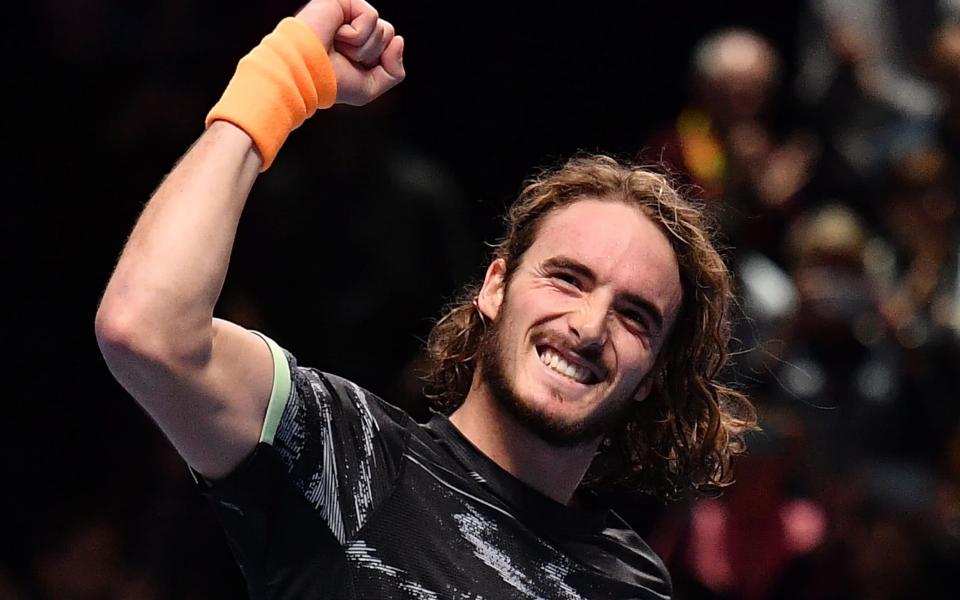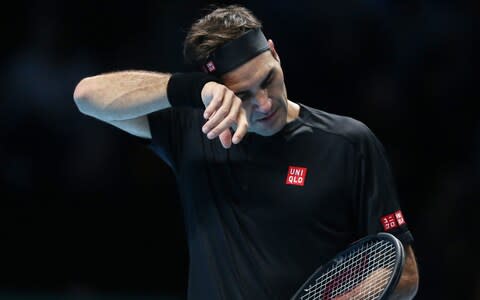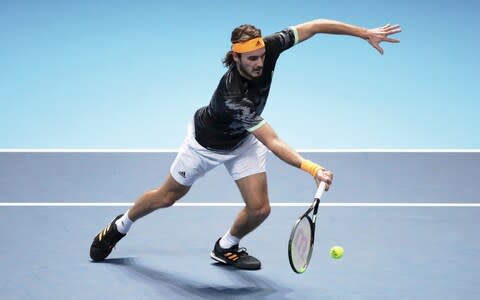Stefanos Tsitsipas eclipses Roger Federer at ATP Finals as Swiss legend admits next generation of tennis stars 'have proven their point this year'

Roger Federer acknowledged that the next generation of tennis stars “have proven their point this year” after he was dumped out of the Nitto ATP Finals by Greek 21-year-old Stefanos Tsitsipas.
The result meant that the three top-ranked players in the world – Rafael Nadal, Novak Djokovic and Federer – have all suffered defeats to younger men at the O2 Arena this week. The big three have also all now been eliminated.
Asked whether he felt that 2020 could be the breakthrough season for the new breed of players – which also includes Alexander Zverev, Dominic Thiem and Daniil Medvedev – Federer replied: “Yeah, I would think so. We [the so-called Big Three] are not getting any younger. So chances increase not because we are getting worse but because they are getting better, I believe.
“I just think they have proven their point this year by qualifying for the ATP Finals, and also now at least one of them making it to the final. Definitely it's that next step they need, and seems like Dominic is in his absolute prime right now.”
Saturday’s semi-final proved a bridge too far for Federer, rather as the Rugby World Cup final had for Owen Farrell and the rest of the England team. In both cases, it felt as if too much psychic energy had been burned in the previous round.

Federer had peaked on Thursday with a blinding display against his nemesis Novak Djokovic, sweeping into the knock-out stages in only 72 minutes. But he came out flat on Saturday, and was unable to change the momentum on his way to a 6-3, 6-4 defeat.
The warning signs were there from the second game, when Federer unaccountably missed two smashes. This was a giveaway sign of sluggish footwork, because his overhead is normally as solid as the Swiss franc. As Federer later confirmed in the interview room, “that hasn't happened in a long, long time – or ever!”
Federer had chances to get back on terms. In fact, he had 12 of them – a dozen break points across the two sets. Wastefully, though, he only converted one. Tsitsipas, by contrast, was a model of economy as he managed three breaks from four attempts.
“I'm frustrated I couldn't play better,” said Federer afterwards. “And when I did and fought my way back” – by scoring that lone break of serve to level the second set at 2-2 – “I threw it away again.
“It's the year-end. It's over now and I can't make it better. I tried everything I could. I tried to chip it eventually, tried to stay back and hit some. I tried to come forward. But of course with his aggression, it's not always easy because he always takes the ball very early himself too.”

This was a case of Federer experiencing a taste of his own medicine. Because, for him, playing Tsitsipas must have felt almost like standing in front of a mirror.
There are differences, of course. Tsitsipas stands three inches taller – so that the racket looks tiny in his hands. He doesn’t have Federer’s balletic grace, nor the magical touch that can conjure a disguised drop shot at the last split-second. But the basics of Tsitsipas’s game have an uncannily familiar look. As he said in his on-court interview: “I grew up watching Roger, wishing I could step out and play him. It’s not easy to copy. I mean this guy does magic on the court. For me, I am trying to do half of what he does. He can be so good sometimes.”
Tsitsipas, too, can be awe-inspiring when everything aligns. He relies on a pinpoint serve, backed up by a scything forehand, and feet that are so fast and springy that he rarely has to use his single-handed backhand.
His net-play, too, is far better than that of most of his contemporaries. He honed his volleys over the past season by playing 21 doubles matches on the ATP tour as well as a massive 78 singles matches. This is a young man with a phenomenal work ethic.
“I knew he was going to be incredibly athletic,” said Federer, whose own physical prowess is underlined by his continuing competitiveness at 38 years old. “His footwork is always on the aggressive side. Any short ball will be attacked. He's one of the best at that in the game.”

The age gap between Tsitsipas and Federer is a fraction over 17 years, the largest for any match ever played at the ATP Finals. In other words, Tsitsipas is closer in age to Federer’s children than he is to Federer himself.
Yet Tsitsipas said that he has matured since January, when he announced himself by beating Federer in the fourth round of the Australian Open. “I can see myself more as a grown-up now than then. Two different Stefanoses from Australia and today.”
Tsitsipas is a fascinating and unusual character. Closely guided by his father and coach, Apostolos, he doesn’t socialise with other players, and has a particularly frosty relationship with two of his most eminent contemporaries: Medvedev and Zverev.
Where most young players rarely depart from the airport-hotel-stadium treadmill, Tsitsipas likes to record and edit artistic YouTube videos. He also comes up with some disarmingly thoughtful press conference answers, as on Friday when he was asked whether he has felt more like a grown-up since he turned 21 in August.
“Yeah, for sure,” Tsitsipas replied. “I think this growth in me was also connecting with other people, which I wasn't really willing in a way to do before, because I was really concentrating on my tennis. I was struggling as a child with fear of rejection, so I was never really able to open up and say what I feel.
“So this has matured me over the last couple of months, taught me a lot of things. I feel much more as a 21 year-old now than I did before.”
If Federer is right, he could soon be winning much more as well.

 Yahoo Sport
Yahoo Sport 





































